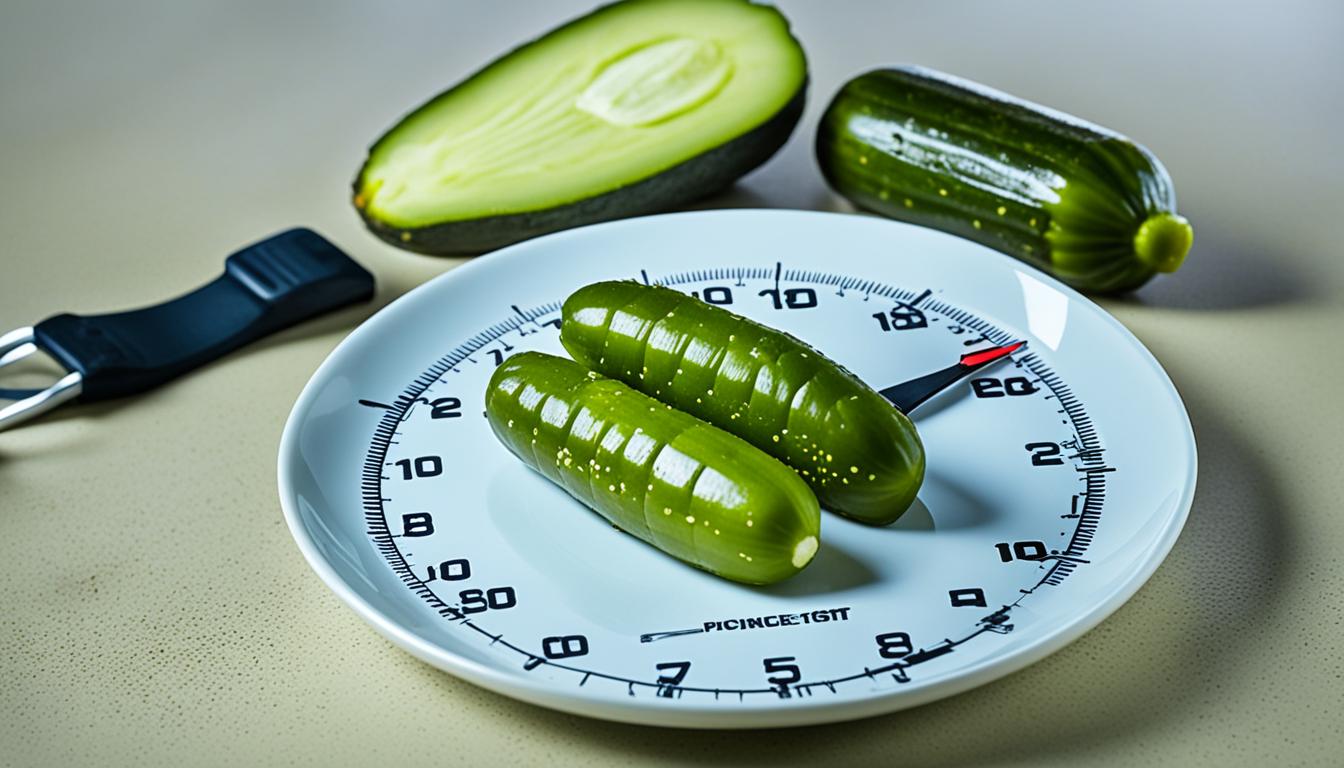Ever thought about how long your opened pickles stay fresh in the fridge? If you love pickles on your sandwiches or in salads, knowing how to keep them fresh is key.
Pickles should be kept cold after opening, just like fridge pickles. Knowing what affects how long they last helps you enjoy their best taste longer.
This article will tell you how long opened pickles last in the fridge. You’ll get tips on keeping pickles fresh and the best ways to store them. Ready to up your pickle game? Let’s start!
Key Takeaways:
- Opened pickles stay good in the fridge for three to four weeks.
- After that, the quality might drop, affecting the brine and texture.
- Hard veggies like cucumbers and radishes keep well; delicate ones like red onions don’t.
- Branded refrigerator pickles can last up to 75 days after making.
- Keep your pickle jar clean to avoid spoilage and throw out bad pickles.
How Long Do Homemade Refrigerated Pickles Last?
Storing homemade refrigerated pickles the right way is essential. It makes them stay fresh and tasty longer. By sticking to a few easy steps, your pickles will remain delicious for a lot more time.
- Start with clean jars: It’s important to clean and sanitize jars before using them for pickles. This step keeps bacteria and other bad stuff away from your pickles.
- Bring the brine to a boil: Always boil the brine before putting it on your veggies. Boiling the brine kills germs and makes your pickles last longer.
- Use sturdy vegetables: Choose vegetables like cucumbers and radishes for pickling. These kinds of veggies stay fresh longer and don’t get soft or discolored easily.
- Store at 40°F or colder: Keeping pickles cool is key. Try to store them at 40°F or less. This stops bacteria from growing and keeps your pickles fresh.
- Keep jars tightly shut: Once you open a jar, make sure to close it well after use. A tight seal keeps air out and preserves the pickles’ taste and texture.
- Wipe away dried-out bits: Sometimes, bits of spices or pickles dry up on the jar’s rim. Clean these off before closing the jar again to avoid mold or spoilage.
Your homemade refrigerated pickles can last three to four weeks in the fridge if you follow these tips. But remember, the sooner you eat them, the better they taste and crunch. So, enjoy your homemade pickles fresh!
Image
Homemade Refrigerated Pickle Storage Tips
| Tips | Description |
|---|---|
| Start with clean jars | Thoroughly clean and sanitize the jars before filling them with pickles to prevent any contaminants. |
| Bring the brine to a boil | Sterilize the brine by bringing it to a boil before pouring it over the vegetables. |
| Use sturdy vegetables | Choose sturdy vegetables, such as cucumbers and radishes, to ensure longer-lasting pickles. |
| Store at 40°F or colder | Keep the pickles stored in a cool environment with a temperature of 40°F or colder. |
| Keep jars tightly shut | Seal the jars tightly after opening to prevent air from entering and causing spoilage. |
| Wipe away dried-out bits | Before resealing the jars, wipe away any dried-out spice or pickle bits to avoid mold formation. |
How Long Do Commercial Refrigerated Pickles Last?
Commercially made refrigerated pickles from well-known brands can stay fresh for up to 75 days. They are packed, shipped, and sold cold. This keeps them fresh. For the best taste and crunch, eat them within the first two to three weeks.
Once opened, keep commercial refrigerated pickles in the fridge, covered in brine. This helps them stay fresh for about three months. Store the pickles in your fridge’s coldest spot. Also, make sure they stay cold. This helps stop fermentation and spoilage.
Commercial Refrigerated Pickle Shelf Life:
| Product | Shelf Life |
|---|---|
| Brand A Refrigerated Pickles | Up to 75 days after manufacturing |
| Brand B Refrigerated Pickles | Up to 60 days after manufacturing |
| Brand C Refrigerated Pickles | Up to 90 days after manufacturing |
Tips for Extending Pickle Shelf Life:
- Store pickles in the coldest part of the fridge.
- Keep pickles submerged in brine.
- Ensure pickles remain cold to prevent fermentation.
- Consume pickles within the recommended time frame.
Signs of Spoiled Pickles
It’s important to know when pickles are bad for your safety and enjoyment. Here are signs to watch for:
Changes in Color or Texture
Color or texture changes are big clues that pickles are bad. Cloudy brine or mushy pickles signal spoilage. Fresh pickles are bright and crisp, so look for these signs.
Visible Mold and Bad Smell
Visible mold on pickles means they’ve gone bad. Mold looks fuzzy or dark. Eating moldy pickles can make you sick.
Also, a bad smell from the jar is a sign of spoiled pickles. Trust your nose. Don’t eat pickles that smell off.
“When in doubt, throw it out.”
Fizzy Brine and Bulging Lid
A fizzy brine shows pickles may be spoiled. It means they weren’t stored right or have bad bacteria. A bulging lid also suggests spoilage from gas buildup. It’s safer to throw these pickles away.
Pickles stored correctly shouldn’t have these spoilage signs. If you see any, prioritize your safety and don’t eat the pickles.
| Signs of Spoiled Pickles | Safety Risk |
|---|---|
| Changes in color or texture | Pickle quality has deteriorated; may pose a health risk |
| Visible mold | Can cause foodborne illness; pickles should be discarded |
| Bad smell | Pickles have spoiled; consuming them may lead to sickness |
| Fizzy brine | Indicates fermentation and spoilage; pickles should not be consumed |
| Bulging lid | Pickles may contain harmful bacteria; best to discard them |
Best Practices for Extending Pickle Freshness
To keep opened pickles fresh, it’s important to follow some best practices:
- Choose the right recipe: Pick a recipe with equal parts water and vinegar for the right acidity. Use vinegar with 5% acidity for best results.
- Fill the jars completely: Fill pickle jars to the top with brine. This prevents air from spoiling them faster.
- Keep the jars clean and tightly shut: Clean the jar rim before sealing. It keeps bacteria out and ensures a tight seal.
- Practice good pickle jar hygiene: Always use clean tools or hands to take pickles out. This keeps the jar germ-free.
- Store in the coldest part of the fridge: Keep your pickles in the fridge’s coldest spot, under 40°F. It keeps them fresh longer.
- Avoid temperature abuse: Keep pickles at a consistent, cold temperature. Avoid leaving them out too long to prevent spoiling.
By following these steps, your opened pickles will stay fresh and tasty longer. You’ll reduce spoilage and get more enjoyment from them.
Can Pickles Go Bad?
Yes, pickles can spoil, so it’s crucial to know how long they last. Most store-bought pickles are safe from causing food illnesses. Yet, eating them within their recommended timeframe is vital. Do pickles expire? They don’t have a set expiration date like other foods. But, their quality can decline over time. Checking your pickles for spoilage signs keeps them fresh and safe.
Signs of Spoiled Pickles
Spotting bad pickles is important for your health. Look out for mold, a sour smell or taste, weird colors or textures, and jars that bulge.
If you see these signs, throw the pickles away. Trusting your senses is key to avoiding bad food.
Proper Pickle Storage
Storing pickles correctly keeps them fresh and tasty. Here’s how to do it:
- Store them in a cool, dry spot away from sun and heat.
- After opening, keep pickles in the fridge covered in their brine. This slows down bacteria growth. Do pickles go bad once opened? Refrigerating extends their life and flavor.
- Make sure the jars are tightly closed to avoid air and spoilage.
These storage tips will help keep your pickles fresh longer.
Checking the jar is a simple freshness test. Look for spoilage signs like bulging lids or odd smells. Discoloration or a slimy feel means they’re bad. When unsure, it’s safest to discard them.
Extend the Life of Your Pickles
Here are more tips to keep your pickles longer:
- Use airtight containers to protect them from air and moisture.
- Keep them cold, under 40°F, to slow bacteria and keep them fresh.
- Sanitize jars before use to avoid contamination.
These steps will help keep your pickles fresh for more time.
| Pickle Type | Shelf Life After Opening |
|---|---|
| Homemade Refrigerated Pickles | 3-4 weeks in the fridge |
| Commercial Refrigerated Pickles | Up to 75 days after manufacturing (best within 2-3 weeks) |
In Summary
Pickles can spoil if not handled or eaten in time. Watch for signs like mold, weird smells or tastes, strange colors or textures, and jar bulging. Keeping opened pickles cold and jars sealed tight helps them last longer. By sticking to these tips, you can enjoy tasty pickles for more time.
Proper Storage for Pickles
Keeping pickles fresh is all about proper storage. Once you open a jar, keep the pickles in the fridge, dunked in their brine. This helps them stay fresh for up to three months. Store your pickles in the fridge’s coldest spot, like the main compartment, not the door.
If you’re short on space, it’s okay to keep unopened pickle jars in the pantry. But remember, pickles in the pantry won’t stay fresh as long as in the fridge. The fridge’s cool temperature slows down spoilage, keeping the pickles’ flavor and texture better for longer.
Freezing pickles is another way to keep them longer, especially if you have too many. But freezing can change their texture, making them soft and less crunchy. If you freeze them, put them in airtight containers and label with the freezing date to track how fresh they are.
Following the right storage tips is key to keep your pickles good. By keeping them in the fridge’s cold part and submerged in brine, or frozen correctly, you’ll enjoy your pickles more.
Tips for Proper Pickle Storage:
- Store opened pickles in the fridge, submerged in brine, for up to three months.
- Preferably store pickles in the coldest part of the fridge, such as the main compartment.
- If space is limited in the fridge, store unopened pickle jars in the pantry.
- Consider freezing pickles for long-term storage, but be aware that the texture may be affected.
| Pickle Storage Method | Recommended Storage Location | Storage Duration |
|---|---|---|
| Opened pickles in brine | Fridge, submerged in brine | Up to 3 months |
| Unopened pickle jars | Pantry or fridge | Varies by brand, check label |
| Frozen pickles | Freezer, in airtight containers | Up to 6 months |
“Proper storage is crucial to maintain the freshness and quality of pickles. Whether you store them in the fridge, pantry, or freezer, following the recommended guidelines will ensure your pickles stay delicious for longer periods.”
Pickle Shelf Life and Expiration Dates
Pickles usually last until the date on their label. But they can be safe to eat after that if they look fine. Still, they might not taste as good.
Store-bought pickles last longer because of how they’re made and packed. Yet, it’s wise to eat them soon for top taste and feel. Always check if they’re okay before eating them if they’re past their due date.
Storing pickles right helps keep them good. They should stay in a cool, dry place, away from light and heat. Changes in temperature can ruin pickles. So, keep them in a dark place like a pantry.
When Should You Check for Spoilage?
Always look over pickles for spoilage before eating them. This makes sure they are fresh and safe. Watch out for mold, color changes, a bad smell, or a soft feel. A bulging lid can mean bad news, too.
- Visible mold growth on the surface of the pickles or in the brine
- Off colors, such as a dull or discolored appearance
- Unpleasant smell, particularly a sour or rotten odor
- Soft or mushy texture
- A bulging lid, which may indicate fermentation or bacterial growth
Extending the Shelf Life of Pickles
Here are some tips to keep your pickles fresh for longer:
- Use airtight containers to keep air and moisture out. This helps stop them from going bad fast.
- Refrigerate pickles to slow bacteria and keep them crisp.
- Make sure the brine covers the pickles well to keep them fresh and prevent drying.
- Always use clean utensils to avoid contamination.
- Check the pickles often. If they look, smell, or feel off, it’s safer to throw them out.
Follow these tips to enjoy tasty and crunchy pickles for more time.
Freezing Pickles as an Option
Can you freeze pickles? Yes, you can. But remember, freezing may change how they feel and taste. Frozen and then thawed pickles often turn soft and unclear, which might not please everyone.
Freezing pickles might not keep them crunchy, but don’t throw away the leftover brine. You can freeze this brine and use it later. It’s great for adding zest to marinades, dressings, or making unique pickle juice pops.
However, Grillo’s Pickles, a big name in the pickle world, advises against freezing. They say it lowers the quality of their pickles. They suggest eating pickles fresh for the best taste and crunch.
To enjoy pickles at their best, don’t freeze them. Use up leftover brine or make pickles in smaller amounts. This way, they stay fresh and tasty. Make sure to store them right and eat them before they go bad.
Yes, freezing pickles can be done, but it might not be the best idea. The texture and taste could change. It’s smarter to find other uses for pickle brine or to eat pickles fresh. That way, you’ll get the best out of your pickles.
Conclusion
Pickles last for weeks in the fridge once you open them. This is true for both homemade and store-bought ones. Homemade ones are best within three to four weeks. But, store-bought pickles can last up to 75 days.
Keep your opened pickles fresh by following some simple tips. Always keep them in the fridge under 40°F. Make sure they’re covered in their brine.
Watch out for signs they’ve gone bad, like color changes or mold. If they look or smell off, it’s time to throw them away. Keeping your pickle jar clean helps your pickles stay good longer.
Handling and storing your pickles correctly is crucial. Enjoy the crunchy, tangy taste of pickles longer with these tips. So dive in and savor them, knowing you’re doing all you can to keep them fresh!





